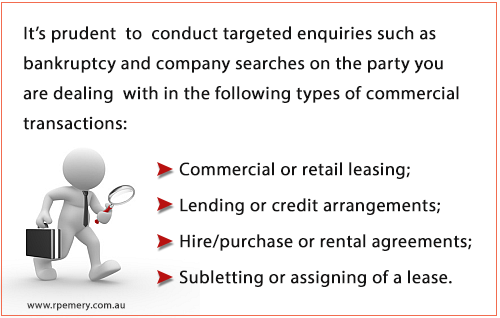Conducting business with people who you don’t know very well can be risky, especially when large sums of money are involved. Sometimes it’s just not enough to rely on gut instinct or the say so of the parties involved.
It is prudent to conduct targeted enquiries or due diligence about the party you are considering dealing with in commercial transactions such as:-
- Commercial or retail leasing;
- Lending or credit arrangements;
- Hire/purchase or rental agreements; and
- Subletting or assigning of a lease.

To reduce the potential risk to your business or cash flow, you need make sure that your proposed tenant or borrower is viable with good cash backup, business experience and cash flow. You need to know if they have a good business name and positive referrals.
The most basic of the enquiries you should make and information you should ask for are:-
- personal identification;
- tax returns;
- bank account statements;
- referrals and references;
- clarification of business experience;
- credit checks;
- bankruptcy search.
Company searches
In addition, if the tenant or borrowing entity is a company, you will need to do a company search to ascertain who the individuals are, who stand behind the company – the directors and shareholders.
It is common practice to request that company directors and/or shareholders give personal guarantees in commercial transactions such as leases or loan agreements. This ensures that any losses you may incur from the company, can be recovered from the individuals personally.
Companies have limited liability.
A tenant company could be a $2.00 off the shelf company with no assets or cash back up. Should  things go wrong, it is easy for the company to cut its losses and simply walk away. A landlord would be limited to retrieving its losses from the company only – not the individuals who stand behind the company. For a leasing transaction, this would be pertinent if the security deposit (usually for an amount of between 1-6 months rent) is not enough to cover costs.
things go wrong, it is easy for the company to cut its losses and simply walk away. A landlord would be limited to retrieving its losses from the company only – not the individuals who stand behind the company. For a leasing transaction, this would be pertinent if the security deposit (usually for an amount of between 1-6 months rent) is not enough to cover costs.
There are disadvantages associated with enforcing personal guarantees, namely the time and cost involved in legal proceedings, among other things. So you might wish to negotiate a higher security deposit in lieu of taking a personal guarantee. Security deposits of course, are much easier for a landlord to access, should things go sour, keeping in mind that they are a limited amount.
How do I do a company search and a bankruptcy search?
Two of the most common search portals in Australia are:-
http://www.veda.com.au/business
http://www.confirm.citec.com.au/citecConfirm/services/index.shtml
These search portals are available to search a large number of different registries, including AFSA (bankruptcy searches), ASIC (company searches) PPSR and land searches.
Generally you register, pay a fee and then you are able to do any number of pertinent searches.
Citec have a useful pdf that explains their Corporate and Individual Searches.
Further resources
Commercial Lease Agreement Template Kits for Each Australian State
 This easy-to-use template kit contains everything you need to successfully lease your commercial premises. It contains the commercial Lease Agreement Template, Easy-to-follow Users Guide and Agreement to Lease
This easy-to-use template kit contains everything you need to successfully lease your commercial premises. It contains the commercial Lease Agreement Template, Easy-to-follow Users Guide and Agreement to Lease
Retail Lease Agreement Template kit
- Professionally drafted retail lease Agreement (doc)
- Professionally Drafted Disclosure statement
- Sample disclosure statement and Retail lease
- Easy to follow help guide
- Getting Started document
- Friendly customer support
Loan Agreements
We offer a range of Loan agreement Templates and Resources.
Commercial Sublease Agreement Template
 Use this template agreement to document the obligations of the sub-tenant and head-tenant.
Use this template agreement to document the obligations of the sub-tenant and head-tenant.
Assignment of lease
 An Assignment of Lease Agreement (in some states referred to as a Transfer of Lease) transfers an existing tenant’s leasehold interest to the new tenant, creating rights and obligations as between the new tenant and the landlord.
An Assignment of Lease Agreement (in some states referred to as a Transfer of Lease) transfers an existing tenant’s leasehold interest to the new tenant, creating rights and obligations as between the new tenant and the landlord.
In effect, the new tenant agrees to step in and take over the existing tenant’s rights and obligations under the Lease. The new tenant becomes bound to the terms and conditions of the Lease, taking the place of the existing tenant, who is then released from it’s obligations as at the date of transfer. In this instance, a tenant who has assigned, or transferred, their leasehold interest will not be liable if the new tenant defaults.
Leasing Commercial or Retail Property? Do you need a Guarantor?
 When setting up a lease it’s important safeguard your investment against tenant default. One way is to nominate a Guarantor for the lease. Guarantors are the people (or other legal entities) who agree to be responsible for the debts of the tenant, should the tenant default.
When setting up a lease it’s important safeguard your investment against tenant default. One way is to nominate a Guarantor for the lease. Guarantors are the people (or other legal entities) who agree to be responsible for the debts of the tenant, should the tenant default.


